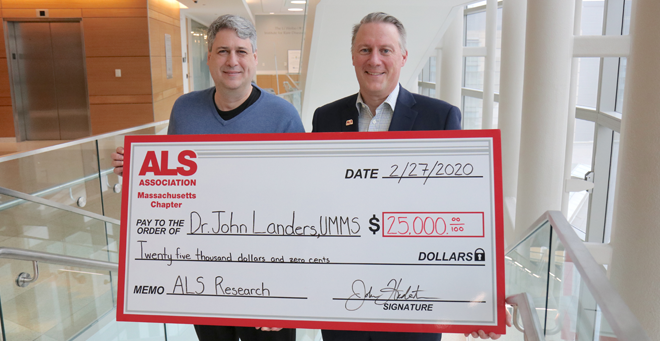
|
The ALS Association - Massachusetts Chapter awarded John Landers, PhD, professor of neurology, a $25,000 grant to further his ongoing research into amyotrophic lateral sclerosis (ALS). ALS is a progressive neurodegenerative disease that affects the motor neurons that control muscle cells. People with ALS slowly lose the ability to initiate and control muscle movement, which often leads to total paralysis and death within two to five years of diagnosis.
“On behalf of The ALS Association - Massachusetts Chapter Board of Directors and staff, I am proud to support Professor Landers and UMass Medical School scientists as leaders in the fight to end ALS,” said John Hedstrom, executive director of The ALS Association - Massachusetts Chapter.
Working with international collaborators, Dr. Landers has worked on projects made possible by The ALS Association through ALS Ice Bucket Challenge donations that led to the discovery of two ALS genes.
“Identifying common pathways leading to ALS is essential in developing therapeutics for the disease,” Landers said.
In 2016, NEK1 was identified as a new gene with multiple functions in neurons, present in approximately 3 percent of all cases of both sporadic and familial ALS in North America and Europe, making it one of the most common genetic causes of the disease. The findings were published in Nature Genetics. Landers and collaborators also identified KIF5A as a novel gene associated with the development of ALS. The discovery, published in the journal Neuron, advances the understanding of what causes ALS and further implicates the role of cytoskeletal defects in the axon as a common factor in the disease.
Related stories on UMassMedNow:
UMass Med Now Discovery of new ALS gene points to common role of cytoskeleton in disease
UMMS-led discovery of ALS gene funded by Ice Bucket Challenge; nets global attention
New gene variants present in 3 percent of all ALS patients